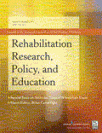
Distance Supervision in Rehabilitation Counseling: Ethical and Clinical Considerations
Background: The use of technology-mediated distance supervision is a rapidly growing area in rehabilitation counseling and other fields. Distance supervision has both tremendous potential and notable challenges to address, including questions of ethics and evidence.
Purpose: This article examines both the ethical and nonethical principles that rehabilitation counseling programs should consider when implementing distance supervision, such as evidence-based practice, competency, confidentiality, informed consent, and access to supervision.
Conclusions: Despite its growing popularity, little empirical evidence exists to support the use of distance supervision as an equivalent and empirically supported means of providing clinical supervision. Suggestions for programs on how to move distance supervision forward as an evidence-based and ethically sound component of rehabilitation counseling are included.
Purpose: This article examines both the ethical and nonethical principles that rehabilitation counseling programs should consider when implementing distance supervision, such as evidence-based practice, competency, confidentiality, informed consent, and access to supervision.
Conclusions: Despite its growing popularity, little empirical evidence exists to support the use of distance supervision as an equivalent and empirically supported means of providing clinical supervision. Suggestions for programs on how to move distance supervision forward as an evidence-based and ethically sound component of rehabilitation counseling are included.
Document Type: Research Article
Publication date: 01 February 2015
- Rehabilitation Research, Policy, and Education is no longer available to subscribers on Ingenta Connect. Please go to http://connect.springerpub.com/content/sgrrrpe to access your online subscription to Rehabilitation Research, Policy, and Education.
- Access Key
- Free content
- Partial Free content
- New content
- Open access content
- Partial Open access content
- Subscribed content
- Partial Subscribed content
- Free trial content